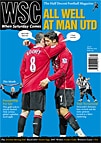 Will Everton be on the move soon – leaving the city of Liverpool? Gavin Willacy examines the history of clubs looking for new homes and concludes that the Blues have little choice but to head for Kirkby
Will Everton be on the move soon – leaving the city of Liverpool? Gavin Willacy examines the history of clubs looking for new homes and concludes that the Blues have little choice but to head for Kirkby
If national media coverage is any barometer, there was surprisingly little uproar when Everton announced that they are considering a move out of Liverpool into neighbouring Kirkby. A few shareholder-fans objected at the AGM, concerned that the city would turn red in their absence, but otherwise the supporters seemed resigned to the inevitable. Once the King’s Dock project fell through in 2002, Everton had to come up with an alternative. With ground-sharing Liverpool’s Dubai-funded ground in Stanley Park seemingly out of the question and the chances of two new stadiums being built in the city unlikely, someone would have to move out.